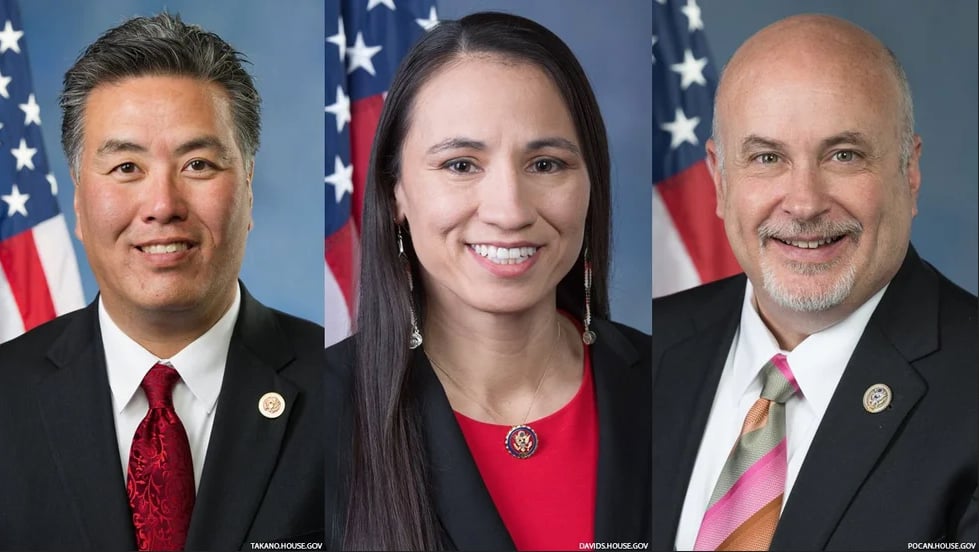
Reps. Mark Takano, left, Sharice Davids, center, and Mark Pocan reintroduced the Equality Act in the House of Representatives Wednesday as part of the Equality Caucus.
The Equality Act, a wide-ranging LGBTQ+ rights bill, was reintroduced in the U.S. House of Representatives and Senate Wednesday.
It would amend civil rights laws to outlaw discrimination based on sexual orientation and gender identity in employment, housing, public accommodations, education, federally funded programs, credit, and jury service.
That means that without the Equality Act, the LGBTQ+ community does not have federal civil rights protections.
The Equality Act would also ban discrimination on the basis of sex in public accommodations and federally funded programs, and expand the definition of public accommodations in the Civil Rights Act of 1964.
The Equality Act passed the House in 2019 and 2021, but stalled in the Senate.
The Equality Act’s fate is uncertain since Republicans have a majority in the House, but Democrats control the Senate and President Joe Biden has endorsed the bill.
Reps. Bella Abzug (D-NY) and Ed Koch (D-NY) first introduced the Equality Act 49 years ago.
In the House, the Equality Act was introduced by members of the Equality Caucus: Chair Mark Pocan and cochairs Mark Takano, Angie Craig, Sharice Davids, Chris Pappas, Ritchie Torres, Becca Balint, Robert Garcia, and Eric Sorensen.
Sens. Tammy Baldwin, Cory Booker, and Jeff Merkley introduced the companion bill in their chamber.
All of the lawmakers who introduced the bills are Democrats.
“LGBTQI+ people deserve the same protections from discrimination as every other marginalized group,” Pocan said in a press release.
Takano, the first openly gay person of color to serve in Congress, said that “Equality shouldn’t depend on your zip code. Not all states offer the same protections against discrimination, and vulnerable members of our community such as trans people and queer people of color are especially impacted by these disparities.”
Davids, who identifies as lesbian, said that “Every American should have equal protection under the law, but in the majority of states across the country, including Kansas, LGBTQI+ Americans lack explicit nondiscrimination protections in housing, education, public accommodations, and other core areas of daily life.”
LGBTQ groups applauded the bill’s reintroduction.
“Without comprehensive federal protections, the basic rights of LGBTQ+ people vary state to state,” Lambda Legal CEO Kevin Jennings said in a press release. “This year, we have read countless stories of LGBTQ+ individuals and families trying to flee states that are intent on harming them.
“While some families can afford to relocate, many cannot. The current patchwork of protections for LGBTQ+ people is inadequate and unjust, which is why we need the absolute clarity of the Equality Act, and we need it now.”
